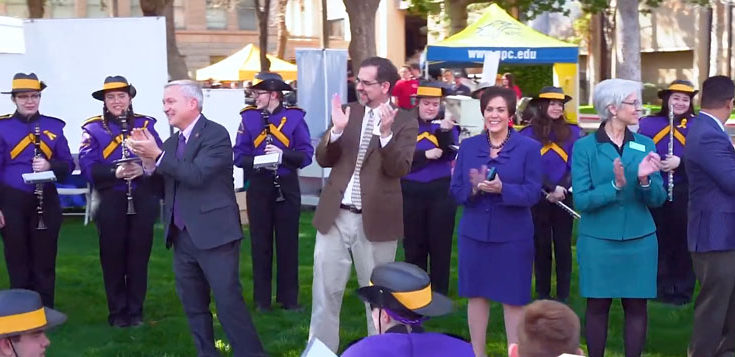Contributed Photo: EAC President Todd Haynie, left, applauds the EAC Marching Band along with other community college representatives at the Arizona State Capitol.
President Haynie believes first classes could be open in about three years
By Jon Johnson
THATCHER – Eastern Arizona College President Todd Haynie said the school is ready to move forward to begin the process of offering baccalaureate degrees if Governor Doug Ducey approves with the stroke of his pen.
“Once he signs that bill, then we’ll sit down – really within a few days – and start to map out a plan for determining can we do this and, if so, what’s the plan.”
On Wednesday, the Senate passed SB 1453, which allows community colleges to offer four-year degrees. A similar bill previously passed in the Arizona House of Representatives, so now all it awaits is a signature from Ducey to go into effect.
Haynie praised State Representative Becky Nutt (R, LD-14) for her efforts to bring this to fruition and said former State Senator Bill Knopnicki previously worked at getting four-year degrees at EAC.
“This whole idea really began decades ago, and maybe longer than that,” Haynie said. “I remember back when I first started at EAC over 20 years ago that Representative Konopnicki really took up this effort and tried really hard and got it really close at one point. Of course, Bill is no longer with us, but I think in many ways that we are standing on the shoulders of those giants who through tremendous effort and work put this idea on the map. And Representative Nutt has worked tirelessly over the past few years to make this happen. And it would not have happened without her . . . I don’t know if I can stress enough how grateful I am to Rep. Becky Nutt for her efforts. This started years ago with Bill Konopnicki, but without the efforts of Rep. Nutt, this would not have happened. She really went to bat for community colleges and rural Arizona.”
If Ducey signs the bill into law the school won’t immediately be able to offer just any four-year degree, however, and the process to begin could take roughly three years, according to Haynie.
First, the college will start the process to determine which four-year programs the college could reasonably offer that make sense for the community and students and benefit the entire Gila Valley.

“It is something the community has asked for,” Haynie said. “People ask me about this all the time. And so, this is really kind of a community effort.”
Once a program is identified, the recommendation will be brought before the school’s governing board. If it gets approval there, it will then be sent to the school’s regional accrediting body – the Higher Learning Commission based in Chicago – and seek approval from them.
“So, this is going to be a long process,” Haynie said. “This is not ‘yay this is passed and tomorrow we can start offering classes.’ It’s going to take a lot of work to get to that point where we determine what program and then we seek the approvals to do it.”
The school will reach out to the local industry partners, such as Freeport McMoRan, Mt. Graham Regional Medical Center, and the prisons, and determine what bachelor degree needs they require for their potential employees, and then craft a program that makes sense for them.
“I really anticipate that one of the first programs that we would offer may be a bachelor’s degree of applied science (or) something like a project management degree,” Haynie said. “We have to do the legwork. It has to pencil out and make sense financially for us.”
Offering certain four-year degrees at EAC could benefit local students and be more affordable than taking the same classes at a university. While the cost to attend one year at Arizona State University for tuition alone is $10,710, EAC caps its tuition cost at $1,350 for 15 credits. Scholarly students can take more credits for the same cost, and local residents usually don’t have room and board costs, which run $13,164 per year for ASU.
Haynie noted that the college will continue its mission to be a community college and that the bill simply allows it to expand its educational opportunities for its students and the community.
“We feel very grateful to the community,” Haynie said. “There’s a sincere and strong desire to see this happen and we want to make this happen for them . . . This has the potential for being a significant benefit to EAC, the community, and all of the rural areas in the state.”









